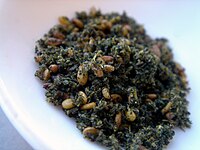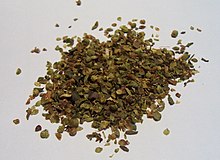
Za'atar, a blend of herbs, sesame seeds and salt
Za'atar (Arabic: زعتر, also romanized zaatar, za'tar, zatar, zatr, zahatar, zaktar or satar) is a generic name for a family of related Middle Eastern herbs from the genera Origanum (Oregano), Calamintha (Basil), Thymus vulgaris (Thyme ) and Satureja (Savory).[1] It is also the name for a condiment made from the dried herb(s), mixed together with sesame seeds, and often salt, as well as other spices.[2] Used in Arab cuisine since medieval times, both the herb and spice mixture are popular throughout the Middle East and Levant.


Oregano Dried Oregano
It is a perennial herb, growing from 20–80 cm tall, with opposite leaves 1–4 cm long. The flowers are purple, 3–4 mm long, produced in erect spikes.
Oregano is an important culinary herb. It is particularly widely used in Turkish, Greek, Portuguese, Spanish, Latin American, and Italian cuisine. It is the leaves that are used in cooking, and the dried herb is often more flavourful than the fresh


Basil fresh dried thyme
Basil is a culinary herb prominently featured in Italian cuisine, and also plays a major role in the Southeast Asian cuisines of Thailand, Vietnam, Cambodia, and Laos. The plant tastes somewhat like anise, with a strong, pungent, sweet smell.
Sesame Seeds - Teel

Magnified.
Sesame is grown primarily for its oil-rich seeds, which come in a variety of colors, from cream-white to charcoal-black. In general, the paler varieties of sesame seem to be more valued in the West and Middle East, while the black varieties are prized in the Far East. The small sesame seed is used whole in cooking for its rich nutty flavour (although such heating damages their healthful polyunsaturated fats), and also yields sesame oil.
Za'atar
Za'atar (zaatar) is a mixture of sumac, sesame seed and herbs frequently used in the Middle East and Mediterranean areas.
It is often mixed with olive oil and spread on bread; sometimes this is done at the table, other times the mix is spread on the bread rounds which are then baked. Za'atar also serves as a seasoning to sprinkle on vegetables, salads, meatballs or kebabs. Much like sausage seasonings, each country has a distinctive style of Za'atar, and each family develops its own special blend.
Hand mixed from sumac, thyme, sesame seeds, hyssop, and oregano.
| < Prev |
|---|
